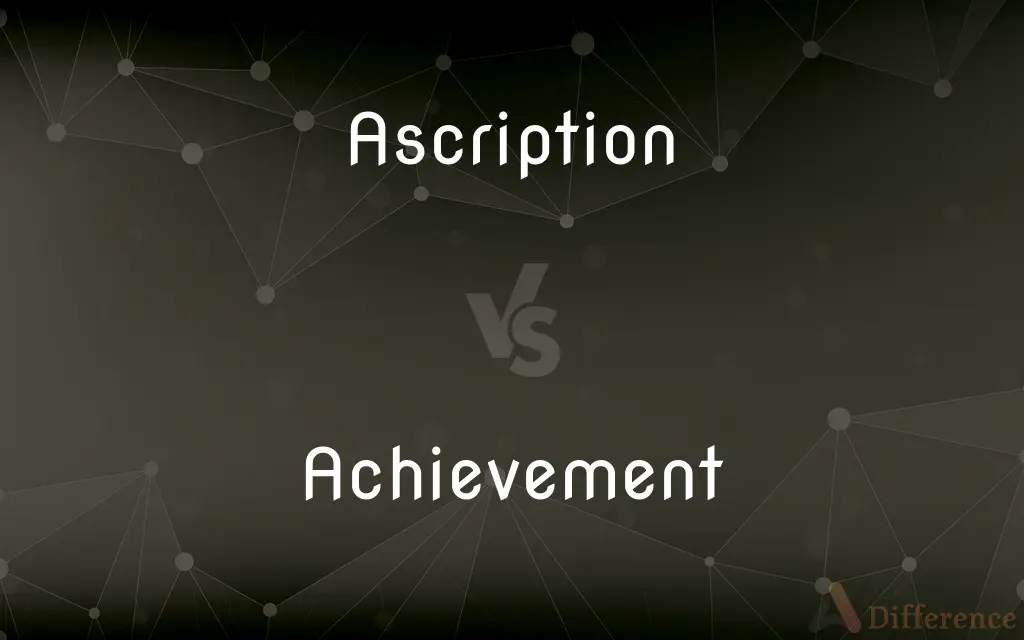Ascription vs. Achievement — What's the Difference?
Edited by Tayyaba Rehman — By Maham Liaqat — Updated on March 29, 2024
Ascription refers to the status or attributes assigned based on birth or background, whereas achievement denotes status or accomplishments attained through one's efforts and abilities.

Difference Between Ascription and Achievement
Table of Contents
ADVERTISEMENT
Key Differences
Ascription involves assigning social status, roles, or qualities to individuals based on inherent characteristics like family background, ethnicity, or gender. This concept emphasizes the importance of factors beyond an individual's control in determining their social position. In contrast, achievement focuses on the accomplishments and merits individuals gain through their actions, efforts, and skills, highlighting the role of personal agency in social mobility and status.
While ascriptive traits are often fixed and unchangeable, such as one's birthplace or parental heritage, achievements can vary widely among individuals, reflecting their diverse talents, efforts, and decisions. This distinction underlines the difference between societies or institutions that value inherited status versus those that reward individual effort and success.
In ascriptive systems, opportunities and resources might be unevenly distributed based on predetermined criteria, leading to societal stratification and limited social mobility. On the other hand, societies that prioritize achievement tend to promote equality of opportunity, allowing individuals to advance based on their capabilities and achievements rather than their background.
The concept of ascription can lead to practices such as nepotism or discrimination, where individuals receive benefits or face barriers due to their ascribed status. Achievement-oriented systems, while ideally meritocratic, are not immune to the influence of ascriptive factors but strive to minimize their impact, focusing on merit and performance as the basis for advancement.
Finally, the balance between ascription and achievement varies across cultures and over time, reflecting each society's values, history, and social dynamics. Understanding this balance is crucial for addressing issues of inequality and designing policies that promote fair access to opportunities and rewards based on merit.
ADVERTISEMENT
Comparison Chart
Basis of Status
Birth, ethnicity, gender, family
Effort, skill, accomplishments
Control by Individual
Limited or none
Significant
Impact on Society
Stratification, limited mobility
Mobility, meritocracy
Key Characteristics
Fixed, inherited
Variable, earned
Societal Implications
Nepotism, discrimination
Equality of opportunity, fairness
Compare with Definitions
Ascription
Assigning status based on inherent characteristics.
In many monarchies, ascription determines one's royal status from birth.
Achievement
Attaining status through personal effort.
Her academic achievements earned her a scholarship to a prestigious university.
Ascription
Can result in limited social mobility.
Due to ascription, some find it hard to ascend beyond their born status.
Achievement
Can be affected by ascriptive factors.
While striving for achievement, some face obstacles due to their ascribed identities.
Ascription
Reflects values and norms of a society.
Societies with strong ascriptive tendencies may resist changes in social hierarchy.
Achievement
Facilitates social mobility.
Achievement allows individuals to rise beyond their socioeconomic origins.
Ascription
Leads to societal roles determined by background.
Ascription often dictates social expectations in traditional communities.
Achievement
Represents meritocratic ideals.
Achievement-based systems aim to ensure that merit, rather than birthright, dictates success.
Ascription
Influences resource distribution.
Ascriptive traits can affect one's access to education and jobs.
Achievement
Emphasizes skill and effort over background.
Modern corporations often value achievement, rewarding performance over pedigree.
Ascription
Ascription, in sociology, is a way to acquire status, along with achievement or chance. In philosophy, it is related to belief ascription.
Achievement
A thing done successfully with effort, skill, or courage
To reach this stage is a great achievement
Ascription
The act of ascribing.
Achievement
The process or fact of achieving something
The achievement of professional recognition
A sense of achievement
Assessing ability in terms of academic achievement
Ascription
A statement that ascribes.
Achievement
A representation of a coat of arms with all the adjuncts to which a bearer of arms is entitled.
Ascription
The act, or an instance, of ascribing a quality, characteristic, quotation, artistic work, or other thing to someone or something.
Achievement
The process of achieving something
She devoted her life to the achievement of voting rights for women.
Ascription
The act of ascribing, imputing, or affirming to belong; also, that which is ascribed.
Achievement
Something that has been achieved, especially by means of skill or perseverance
The discovery of antibiotics is one of the great achievements of modern medicine.
Ascription
Assigning some quality or character to a person or thing;
The attribution of language to birds
The ascription to me of honors I had not earned
Achievement
The act of achieving or performing; a successful performance; accomplishment.
Ascription
Assigning to a cause or source;
The attribution of lighting to an expression of God's wrath
He questioned the attribution of the painting to Picasso
Achievement
A great or heroic deed or feat; something accomplished by valor or boldness.
Achievement
(heraldry) An escutcheon or ensign armorial; a full display or depiction of all the heraldic components to which the bearer of a coat of arms is entitled; a funeral shield: the hatchment.
Achievement
(video games) An award for completing a particular task or meeting an objective in a video game.
Finishing the game does not give you a 100% score until you have unlocked all of the achievements.
Achievement
The lexical aspect (aktionsart) of verbs or predicates that change in an instant.
Achievement
(sociology) The successful completion of a socially defined goal or task, highlighting individual or group accomplishment.
Achievement
The act of achieving or performing; an obtaining by exertion; successful performance; accomplishment; as, the achievement of his object.
Achievement
A great or heroic deed; something accomplished by valor, boldness, or praiseworthy exertion; a feat.
[The exploits] of the ancient saints . . . do far surpass the most famous achievements of pagan heroes.
The highest achievements of the human intellect.
Achievement
An escutcheon or ensign armorial; now generally applied to the funeral shield commonly called hatchment.
Achievement
The action of accomplishing something
Common Curiosities
How do ascriptive factors affect one's opportunities?
Ascriptive factors can limit or enhance opportunities based on societal norms and biases, potentially leading to inequality in access to education, employment, and social mobility.
Is achievement always meritocratic?
Ideally, achievement reflects meritocracy, but in practice, ascriptive factors can influence one's ability to achieve, highlighting the complexity of achieving true meritocracy.
Can someone overcome ascriptive disadvantages?
While challenging, individuals can overcome ascriptive disadvantages through personal effort, societal support systems, and policies aimed at reducing inequality and promoting meritocracy.
Can achievement-oriented societies completely eliminate ascriptive influences?
While achievement-oriented societies aim to minimize ascriptive influences, completely eliminating them is challenging due to underlying societal norms, historical inequalities, and unconscious biases.
Can ascriptive and achievement factors coexist in a society?
Yes, most societies exhibit a mix of ascriptive and achievement-based attributes, with varying emphasis on each depending on the cultural, economic, and legal context.
How do cultures vary in their emphasis on ascription versus achievement?
Cultures vary widely, with some placing greater importance on inherited status and others on individual accomplishments, often reflecting historical, economic, and social factors.
How do organizations balance ascription and achievement in recruitment?
Organizations may balance these factors by implementing policies like affirmative action to address ascriptive disadvantages, while also emphasizing merit and performance in their recruitment and promotion practices.
What is the difference between ascription and achievement?
Ascription is about the status or qualities assigned based on one's background, while achievement refers to status or accomplishments gained through personal efforts.
How can societies encourage achievement while respecting ascriptive identities?
Societies can encourage achievement by ensuring equal access to opportunities and resources, while also respecting and valuing diverse ascriptive identities through inclusive practices and policies.
What role do education and policy play in balancing ascription and achievement?
Education and inclusive policies are crucial for minimizing the impact of ascription and promoting achievement as the basis for advancement, aiming to ensure equal opportunities for all individuals.
How does ascription impact individual identity?
Ascription can significantly shape an individual's identity, embedding traits such as ethnicity, family heritage, and gender roles into their self-conception and how others perceive them.
How do ascriptive factors influence social networks?
Ascriptive factors can influence social networks by determining the groups individuals are born into or have access to, potentially impacting their social capital and opportunities.
What is the role of education in mitigating ascriptive inequality?
Education plays a crucial role by providing knowledge and skills that enable individuals to pursue achievement regardless of their ascribed background, promoting social mobility and reducing inequality.
Are there any benefits to ascriptive systems?
Ascriptive systems can provide a sense of identity, belonging, and continuity within communities and cultures, though they often come at the cost of limiting individual potential and social mobility.
What are examples of ascriptive traits?
Examples of ascriptive traits include race, gender, family lineage, nationality, and inherited social status or wealth.
Share Your Discovery

Previous Comparison
Corella vs. Cockatoo
Next Comparison
Comeback vs. ReturnAuthor Spotlight
Written by
Maham LiaqatEdited by
Tayyaba RehmanTayyaba Rehman is a distinguished writer, currently serving as a primary contributor to askdifference.com. As a researcher in semantics and etymology, Tayyaba's passion for the complexity of languages and their distinctions has found a perfect home on the platform. Tayyaba delves into the intricacies of language, distinguishing between commonly confused words and phrases, thereby providing clarity for readers worldwide.
















































